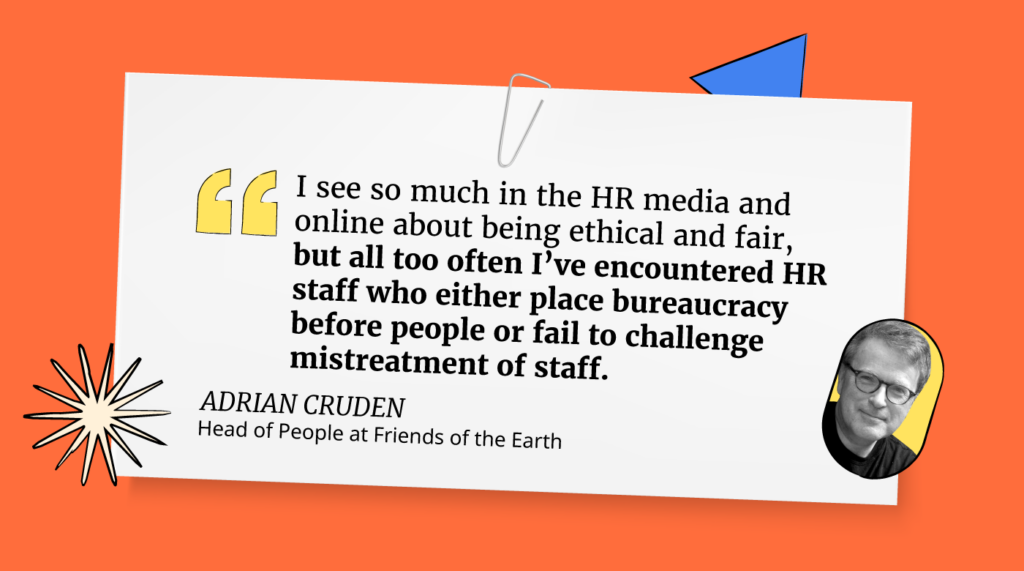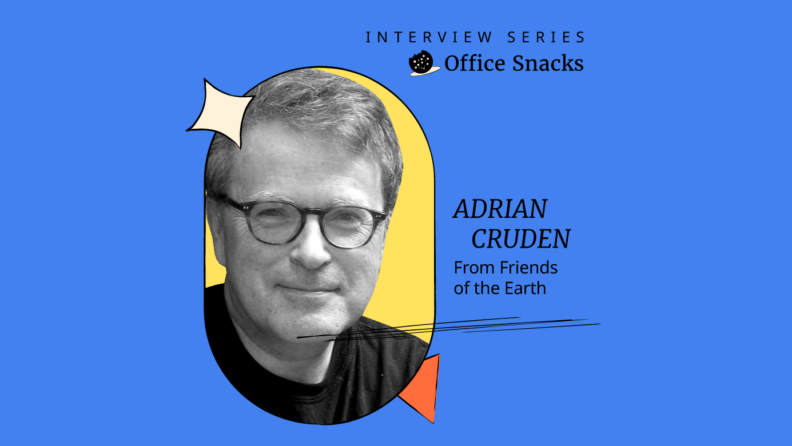In our Office Snacks series we interview members of our community to delve into their varied buffets of experience and come away with juicy insights and ideas.
Hi Adrian, we’d love to get to know you better, where are you based?
I am homebased in Yorkshire in northern England, though originally from Scotland.
How’d you get to where you are today?
By two routes… I’ve worked in human resources in the voluntary/not for profit sector for over thirty years, in organisations of various shapes and purposes, both professionally and as a board member. By working for organisations with social value at their core, I think the overriding thing has been that I’ve always kept a sense that at heart people are good and kind.
The other route has been that for much of my life I’ve been politically active and involved in campaigning for social and environmental justice. So, arriving last year to work with Friends of the Earth has in many ways felt like a great convergence of my professional and personal worlds.
How does your typical day look, do you have a set routine you stick to?
Like most HR people I’d probably say there’s not really a typical day. I normally work from home and usually start around 08:30 and do early calls with my People team colleagues. Then there will be a range of other meetings covering a range of issues with colleagues in every part of the organisation, as well as with reps from the recognised Unite trade union.
We are able to choose when we work between 8am and 9pm each day, subject to being available for planned meetings, so I am able to sometimes take a longer lunch break to go for a walk or do some pressing domestic task, but I usually wrap up for the day between 5pm and 6pm.
How do you describe your job to others?
“The best job I’ve ever had” is how I fairly instinctively describe it to people. It’s a privilege to enjoy your work and I’m very conscious of how fortunate I am—I know so many people are stuck in roles where they are unhappy and feel exploited.
At Friends of the Earth, I see my own, and our team’s, role as essentially enabling others to work effectively towards our organisation’s mission of campaigning on solving the climate and nature crises. We have highly committed colleagues and sometimes the biggest issue is about helping them to pace and look after themselves.

What’s your favorite part of your job?
My colleagues: we have an incredible group of very committed people dedicated to what they’re doing.
The sense of purpose at Friends of the Earth is palpable, so it makes working so enjoyably satisfying. It’s not without challenges, of course—we’re all human—but it makes for a very collegiate atmosphere.
What’s your biggest challenge and how do you overcome it?
Homeworking/hybrid working has huge advantages in so many ways—both personally and environmentally for two. But it does remove a lot of the informal and casual aspects of working with others.
We have things in place to help—we have regular away days and in-person meetings, and we have a nice algorithm called donut that pairs up colleagues for random online coffee breaks once a fortnight.
What do you think is the biggest misconception around HR?
I’m not sure it’s a misconception, but rather a challenge for HR staff: we believe as a profession that we’re enablers, working to support and empower people to be their best.
I see so much in HR the media and online about being ethical and fair, but all too often I've encountered HR staff who either place bureaucracy before people or fail to challenge mistreatment of staff.
In far too many ways, HR can end up reflecting the cold heart of a company rather than trying to warm it. I detest terms like human capital—we are not bipedal carbon units; we are feeling, reasoning, living beings and our work should be where we gain added fulfillment.
Friends of the Earth recently made the decision to switch to a 4 day working week. Can you tell us the rationale behind the decision?
Because we can and we should. Technology has progressed massively over the last few decades.
IT improvements mean that work like information processing, data analysis and communications that took a whole day for office workers to do in 1972 had fallen to 90 minutes by 2012 and even further since, massively increasing productivity.
Other types of work have also seen huge increases in productivity over the same period and beyond, opening up huge possibilities to combine growing productivity with increased leisure.
Several large-scale pilots in multiple countries have shown that a reduced working week brings real benefits for employers and employees.
As workers have more leisure time, they are more energised and focused in what they do—so not only is what we can do maintained, it can actually be enhanced by working fewer hours.
It is also simply healthier for everyone—for individual workers, their organisations and companies, and society as a whole. Long hours and stressed, tired people will not create effective workplaces, nor happy, healthy communities.
We have done a lot of preparation in terms of working systems and culture, and staff pay is unchanged.
Can you give an example of a working system you’ve changed?
We have examined our meetings processes and culture so that they remain inclusive, but are also more focused and decision-oriented: so clearer agendas, timings, and outcomes. It is an ongoing process but one that ensures we keep how we work under review and seek constant improvement.
What other HR trends are you excited about?
The shift to hybrid working, while as mentioned above creates challenges, also creates great possibilities. We can employ people in parts of the country where we did not previously have a physical presence, and more flexibility in working hours creates potential for people often excluded from the workforce, or from career development, to be able to access life-changing opportunities.
I am also heartened by the revival of trade unionism in the UK. It is important that workers are listened to and heard. From an HR perspective, recognising and engaging with a strong union, as we do, means you are working with a far more authentic medium than any consultation committees can provide, however well-intentioned or resourced. You can get things agreed that are more likely to be tested and accepted—and so more likely to work for the benefit of all.
What trends are you not so excited about?
The continuing marginalisation of so many workers is depressing as the British government gleefully torches what it calls red tape—and what I view as actually fairly minimal protections for all of us who work on employment contracts.
I remember decades ago reading an article in the HR press that lauded the idea of a tiered workforce that included one in three people being “flexible employees” with no rights and easily hired and fired.
I was appalled by the idea then and am even more appalled by the reality of it now. We are the sixth richest country in the world but the second most unequal economically in the western states, and it shows.
What’s been your most successful initiative to date and why?
I think there are two pieces of large-scale work I am proud of in my career: one was diversifying the staff of an inner-city social housing organisation from being almost exclusively white to one with one-third of the team being people of colour. This reflected our client base and led to much better services and support for our tenants.
The other was when I persuaded a larger organisation that was advocating a living wage standard to adopt it for our own staff. It took a huge amount of work over almost two years and brought six pay scales into one, but it led to significant increases for lower-paid staff and significantly reduced staff turnover—to the benefit of all.
What’s the best piece of advice you’ve ever received?
I worked for a national disability charity and my line manager, Marie Taylor, coached our team on understanding different communication styles that stressed getting to the core of what people are actually saying. Hearing as well as listening is key.
Sadly, Marie passed away far, far too early in life, but her wisdom has stayed with me however imperfectly. I know I need to keep on working to turn her words into reality.
Lastly, and most importantly, what’s your favorite office (home or otherwise) snack?
Roasted cheese melted over mashed banana on toast. Nothing compares.
What’s your favorite office snack?
Work in People and Culture? Want to share your ideas?
Applications to be interviewed are open to anyone (yes anyone!) so don’t hesitate to fill in the form for an opportunity to share your knowledge and ideas.


